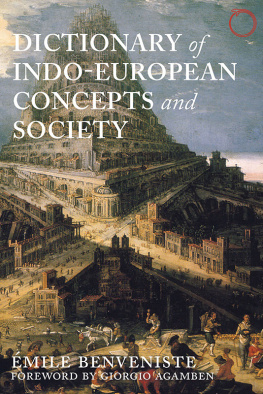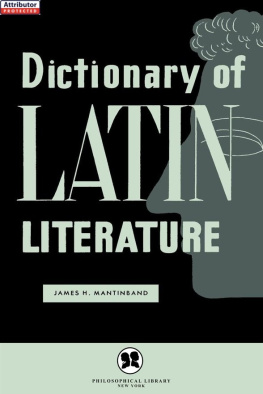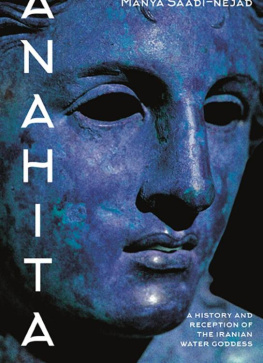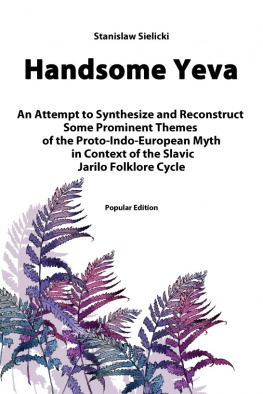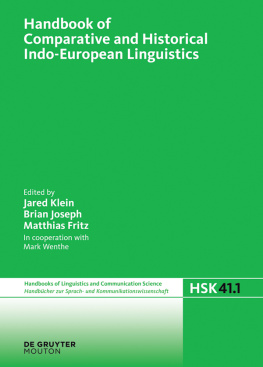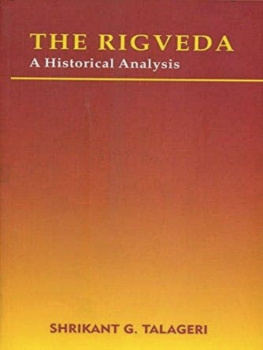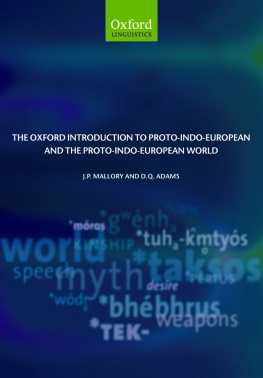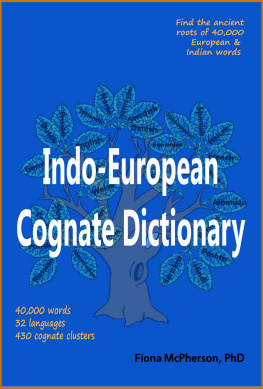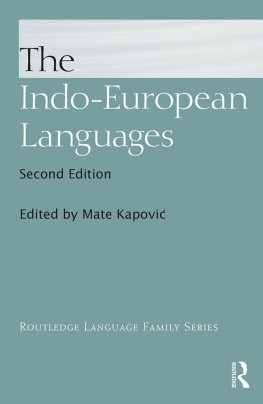
Dictionary of Indo-European Concepts and Society

Executive Editor
Giovanni da Col
Managing Editor
Sean M. Dowdy
Editorial Board
Anne-Christine Taylor
Carlos Fausto
Danilyn Rutherford
Ilana Gershon
Jason Throop
Joel Robbins
Jonathan Parry
Michael Lempert
Stephan Palmi
www.haubooks.com
2016 Hau Books.
Foreword: The Vocabulary and the Voice 2016 Hau Books and Giorgio Agamben.
Original French edition, Le vocabulaire des institutions Indo-Europeenes , 1969 Les Editions de Minuit, Paris.
English translation by Elizabeth Palmer (with summaries, table, and original index by Jean Lallot), 1973 Faber and Faber Ltd., London (also published in 1973 by University of Miami Press).
Cover and layout design: Sheehan Moore
Cover image: The Tower of Babel, Hendrick van Cleve III (ca. 15251589), ca. Sixteenth Century, Oil, Krller-Mller Museum, Netherlands, KM 100.870
Typesetting: Prepress Plus ( www.prepressplus.in )
ISBN: 978-0-9861325-9-9
LCCN: 2016955902
Hau Books
Chicago Distribution Center
11030 S. Langley
Chicago, IL 60628
www.haubooks.com
Hau Books is marketed and distributed by The University of Chicago Press.
www.press.uchicago.edu
Printed in the United States of America on acid-free paper.
Table of Contents
foreword
Preface
List of Abbreviations
BOOK I: ECONOMY
section i: livestock and wealth
Chapter One: Male and Sire
Chapter Two: A Lexical Opposition in Need of Revision: ss and porcus
Chapter Three: Prbaton and the Homeric Economy
Chapter Four: Livestock and Money: pecu and pecunia
section ii: giving and taking
Chapter Five: Gift and Exchange
Chapter Six: Giving, Taking, and Receiving
Chapter Seven: Hospitality
Chapter Eight: Personal Loyalty
section iii: purchase
Chapter Nine: Two Ways of Buying
Chapter Ten: Purchase and Redemption
Chapter Eleven: An Occupation without a Name: Commerce
section iv: economic obligations
Chapter Twelve: Accountancy and Valuation
Chapter Thirteen: Hiring and Leasing
Chapter Fourteen: Price and Wages
Chapter Fifteen: Credence and Belief
Chapter Sixteen: Lending, Borrowing, and Debt
Chapter Seventeen: Gratuitousness and Gratefulness
BOOK II: THE VOCABULARY OF KINSHIP
Introduction
Chapter One: The Importance of the Concept of Paternity
Chapter Two: Status of the Mother and Matrilineal Descent
Chapter Three: The Principle of Exogamy and its Applications
Chapter Four: The Indo-European Expression for Marriage
Chapter Five: Kinship Resulting from Marriage
Chapter Six: Formation and Suffixation of the Terms for Kinship
Chapter Seven: Words Derived from the Terms for Kinship
BOOK III: SOCIAL STATUS
Chapter One: Tripartition of Functions
Chapter Two: The Four Divisions of Society
Chapter Three: The Free Man
Chapter Four: Phlos
Chapter Five: The Slave and the Stranger
Chapter Six: Cities and Communities
BOOK IV: ROYALTY AND ITS PRIVILEGES
Chapter One: Rex
Chapter Two: xay - and Iranian Kingship
Chapter Three: Hellenic Kingship
Chapter Four: The Authority of the King
Chapter Five: Honor and Honors
Chapter Six: Magic Power
Chapter Seven: Krtos
Chapter Eight: Royalty and Nobility
Chapter Nine: The King and His People
BOOK V: LAW
Chapter One: Thmis
Chapter Two: Dk
Chapter Three: Ius and the Oath in Rome
Chapter Four: * med - and the Concept of Measure
Chapter Five: Fas
Chapter Six: The Censor and Auctoritas
Chapter Seven: The Quaestor and the * Prex
Chapter Eight: The Oath in Greece
BOOK VI: RELIGION
Chapter One: The Sacred
Chapter Two: The Libation
Chapter Three: The Sacrifice
Chapter Four: The Vow
Chapter Five: Prayer and Supplication
Chapter Six: The Latin Vocabulary of Signs and Omens
Chapter Seven: Religion and Superstition
Table
Bibliographical Note
foreword
The Vocabulary and the Voice
Giorgio Agamben
Translation by Thomas Zummer
mile Benvenistes Le vocabulaire des institutions indo-europennes is certainly the culmination of twentieth-century linguistics, in both senses of the term. It is here that the nineteenth-century project of comparative grammar had reached its highest point, and, simultaneously, coincided with its end. While there certainly will be further studies that prolong the scientific orientation embodied in the prestigious genealogy of Bral, Saussure, Meillet, and Benveniste, it is also the case that, after the death of Benveniste, linguistics as a whole has taken quite different paths, whereof the school of transformational-generative grammar is such an outstanding example. It is all the more pressing, then, to understand what gives Benvenistes conception of language such an unusual character. It is necessary, in other words, to investigate the background, to show what is really diversified, and in this manner, to try to understand upon what seemingly insurmountable obstacle this project has been shipwrecked.
The conception that it was possible to trace, through purely linguistic analysis, the prehistoric, or at least the most archaic stages of social history, was earlier hinted at by Hermann Usener in his book Gtternamen ([1896] 2000). Usener, whose research concerned the names of the Gods, noted that for such an investigation we have no other documents than those that come from an analysis of language (ibid.: 5). As early as 1859, the Genevan linguist and patrician Adolphe Pictet, who had a likely influence on the young Saussure, published the two volumes of his masterpiece Les origines indoeuropennes. As his subtitle, Essai de palontologie linguistique, suggests, his purpose was to reconstruct the whole life of a prehistoric people, the Indo-Europeans (or Aryans as he preferred to call them), entirely through the analysis and comparison of words. Because words last as long as bones the linguist, like the paleontologistwhose examination of the fossil record can not only reconstruct the animal, but also instruct us about habits, ways of moving, feeding, etc.can replenish, through an examination of common linguistic data, the state of material, social and moral welfare of the people who have produced this primitive idiom . (Pictet 1877: 6).
Still, Benveniste was determined to put himself at a distance from such a model. While not specifically naming Pictet in the Preface to the Vocabulaire probably one of the last texts he wrote (the Vocabulaire was published four months after the hemiplegia which rendered him aphasic until his death)Benveniste refers to his predecessors in these terms:
Il est apparu trs tt aux spcialistes de lindo-europen que les concordances entre les vocabulaires des langues anciennes illustraient les principaux aspects, surtout matriels, dune culture commune; on a ainsi les receueilli preuves de lhritage lexical dans les termes de parent, les numraux, les noms danimaux, des mtaux, dinstruments agricoles, etc. Plusieurs auteurs successifs, du XIX e sicle jusqu ces dernires annes, se sont des employs dresser des rpertoires, au demeurant fort utiles, de ces notions communes . ( Voc ., I, pg. 9)
Although he adds immediately: Notre entreprise est entirement diffrente (ibid., pg. 12).
What does this incomparable novelty consist of? Benveniste soon clarifies his purpose. For him, the task is not to make an inventory of the Indo-European institutional realities as they were defined by lexical correspondences between languages, but to investigate the genesis and development of the vocabulary that refers to those realities.
Next page
